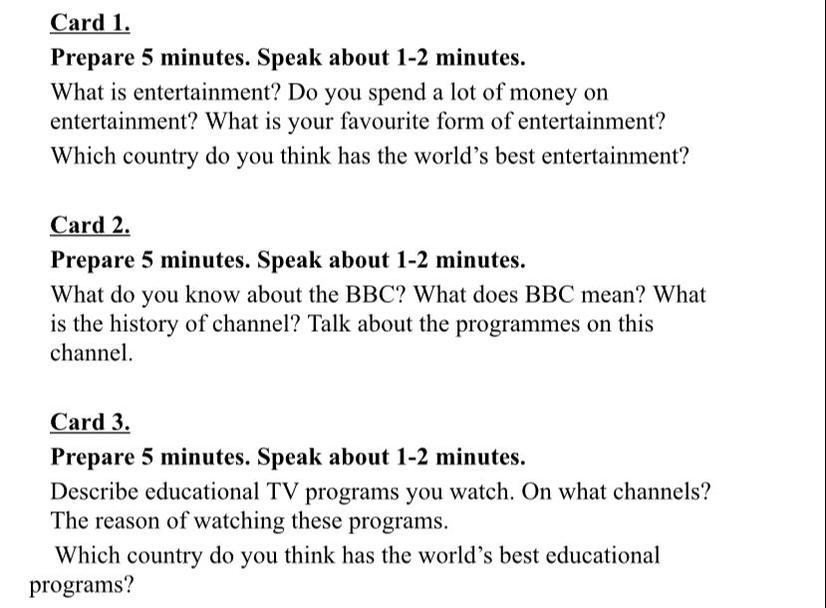Card 1.
Prepare 5 minutes. Speak about 1-2 minutes.
What is entertainment? Do you spend a lot of money on
entertainment? What is your favourite form of entertainment?
Which country do you think has the world's best entertainment?
Card 2.
Prepare 5 minutes. Speak about 1-2 minutes.
What do you know about the BBC? What does BBC mean? What
is the history of channel? Talk about the programmes on this
channel.
Card 3.
Prepare 5 minutes. Speak about 1-2 minutes.
Describe educational TV programs you watch. On what channels?
The reason of watching these programs.
Which country do you think has the world's best educational
programs? Срочно!!! 100 баллов дам! Мне завтра надо уже сдать!

Ответы на вопрос
Позначте мою відповідь найкращою, дякую!!!
Card 1
Entertainment, in essence, is the means through which individuals seek amusement, enjoyment, and diversion from their daily routines. It encompasses a wide array of activities, including but not limited to movies, music, sports, games, and social gatherings.Personally, I believe in maintaining a balanced approach to entertainment spending, allocating resources based on priorities and preferences. While some events or experiences may warrant a higher expenditure, I also appreciate simpler, cost-effective forms of entertainment.My favorite form of entertainment varies, but I often find solace in reading books. The immersive nature of literature allows me to escape into different worlds, broadening my perspectives and fostering a sense of relaxation.As for the country with the world's best entertainment, it's subjective and depends on individual tastes. Hollywood in the United States is renowned for its influential film industry, Bollywood in India is celebrated for vibrant and diverse cinema, and various countries excel in music, sports, and cultural events. Each nation contributes uniquely to the global tapestry of entertainment, making it challenging to pinpoint a single "best" source.
Card 2
The BBC, or British Broadcasting Corporation, is a prominent public service broadcaster headquartered in the United Kingdom. Founded in 1922, it has played a pivotal role in shaping the global media landscape. The BBC operates multiple television channels, radio stations, and an extensive online platform.The acronym "BBC" originally stood for the British Broadcasting Company when it was established by a group of private companies. However, it transitioned into a public service corporation and adopted its current name, the British Broadcasting Corporation, in 1927. The BBC operates under a Royal Charter, emphasizing its commitment to public service, impartiality, and high journalistic standards.Throughout its history, the BBC has been a pioneer in broadcasting, introducing innovative programs and setting industry standards. Its radio broadcasts during World War II and iconic television shows such as "Doctor Who" and "Fawlty Towers" have left an indelible mark on popular culture.The BBC offers a diverse range of programs across various genres. In news and current affairs, "BBC News" is globally renowned for its credibility and comprehensive coverage. The network also excels in producing quality dramas like "Sherlock" and captivating documentaries such as "Planet Earth." Additionally, its radio stations cater to a wide audience, providing content ranging from news and music to cultural programming.The BBC's commitment to public service broadcasting and its influential role in shaping media content make it a key player in the global media landscape, reflecting the organization's enduring legacy and impact.
Card 3
Educational TV programs play a crucial role in broadening knowledge and fostering intellectual growth. Personally, I find myself drawn to documentaries and educational series that delve into science, history, and technology. Channels like National Geographic, BBC Earth, and the Discovery Channel are my go-to sources for engaging and informative content.The reason I watch these programs is rooted in a desire for continuous learning and staying informed about the world around me. Educational TV not only provides valuable insights but also presents information in a visually compelling manner, making the learning experience more enjoyable.When it comes to the country with the world's best educational programs, it's challenging to single out one as the definitive leader. Many nations contribute significantly to educational content, each with its unique approach and expertise. The United States, with channels like PBS and the History Channel, offers diverse and high-quality educational programming. Similarly, the BBC in the United Kingdom is renowned for its informative documentaries and cultural programs. Countries like Japan and Germany also have educational channels that cater to a global audience.Ultimately, the effectiveness of educational programs often lies in the diversity of perspectives and the ability to present complex information in an accessible and engaging manner. Different countries bring their cultural and educational strengths to the table, collectively contributing to a rich tapestry of global educational content.